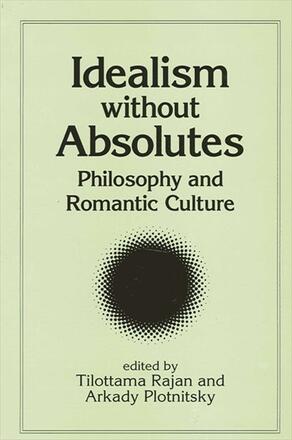
Idealism without Absolutes
Philosophy and Romantic Culture
Alternative formats available from:
Extends the boundaries of Romantic culture from its pre-Kantian past to contemporary theory and beyond.
Description
Idealism without Absolutes offers an ambitious and broad reconsideration of Idealism in relation to Romanticism and subsequent thought. Linking Idealist and Romantic philosophy to contemporary theory, the volume explores the multiplicity of different philosophical incarnations of Idealism and materialism, and shows how they mix with and invade each other in philosophy and culture. The contributors discuss a wide range of major figures in the long Romantic period, from Kant and Hegel to Nietzsche, as well as key figures defining the contemporary intellectual debate, including Freud, Heidegger, Adorno, Lyotard, Derrida, de Man, and Deleuze and Guattari. While preserving the significance of the historical period extending from Kant to the early nineteenth century, the volume gives the concept of Romantic culture a new historical and philosophical meaning that extends from its pre-Kantian past to our own culture and beyond.
Tilottama Rajan is Canada Research Chair in English and Theory at the University of Western Ontario. She has published several books, including the coedited volume (with David L. Clark), Intersections: Nineteenth-Century Philosophy and Contemporary Theory, published by SUNY Press. Arkady Plotnitsky is Professor of English, a University Faculty Scholar, and Director of the Theory and Cultural Studies Program at Purdue University. He has published several books, including, most recently, The Knowable and the Unknowable: Modern Science, Nonclassical Thought and the "Two Cultures. "
Reviews
"…this volume does a good job in making the case for rethinking idealism and offers several very compelling and provocative readings … this is an extremely valuable volume of essays. Rather than offering an overall thesis of 'Idealism without Absolutes,' it offers specific readings of individual texts or clusters of texts meant to incite conversation and provoke thought. " — H-Net Reviews (H-German)
"…it is the de-absolutizing of Hegel … that remains the core of this volume and its chief merit … There is no essay without something worthwhile for any reader compelled by the subject. " — University of Toronto Quarterly
"In providing a first push in the direction of rethinking idealism, as emancipated from the traditional story of absolute positing and absolute understanding, the authors succeed in opening up new avenues for further thought and writing. " — H-Net Review
"This book is a timely revisiting of German Romantic Idealism that energetically explores the implications of the twin propositions of an Idealism without absolutes and a materiality without matter. " — Orrin N. C. Wang, author of Fantastic Modernity: Dialectical Readings in Romanticism and Theory
"This book revitalizes Idealism as a viable mode of literary theory, which enriches our developing understanding of Romantic culture. In this sense, the book rejuvenates the field of Romanticism as the paradigm maker for literary analysis. " — Denise Gigante, Stanford University